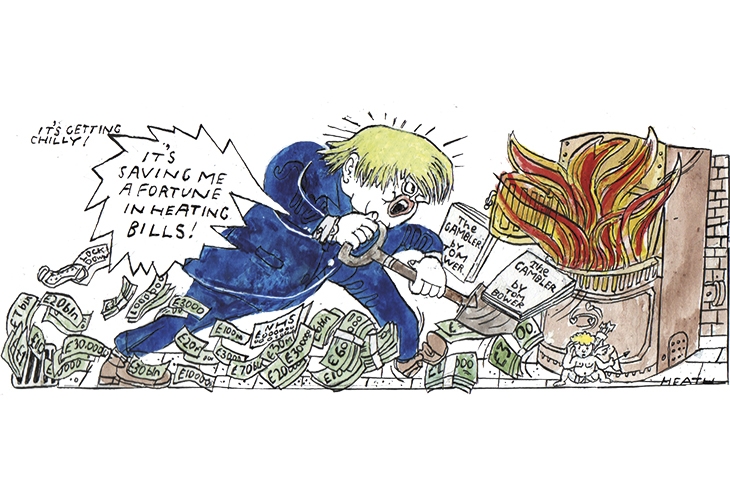Home
Coronavirus was on the increase. At the beginning of the week, Sunday 4 October, total deaths (within 28 days of testing positive for the coronavirus) stood at 42,317, of whom 346 had died in the past week, compared with 212 the week before. Between 25 September and 2 October, 15,841 cases of coronavirus were omitted from official figures, through some blunder with a spreadsheet. As a consequence, on 30 September the official daily tally of 7,109 positive test results should have been 3,049 higher, and so on. Those who tested positive were told but the tracing of their contacts was delayed. Because fewer of those being admitted to hospital were put on ventilators, no use had been made of 30,000 ventilators for which the government had paid £569 million. Sir Lindsay Hoyle, the Speaker of the House of Commons, said he was ‘very very angry’ at the ‘reckless’ behaviour of Margaret Ferrier, a Scottish Nationalist MP who had travelled from Glasgow to London with Covid-19 symptoms and spoken in the House, then returned home by train after testing positive; the SNP suspended her. Sir Roger Penrose, aged 89, won the Nobel prize for physics for his work connecting the theory of general relativity and black holes.
Boris Johnson, the Prime Minister, told the virtual Conservative party conference: ‘We believe that in ten years’ time offshore wind will be powering every home in the country.’ He said: ‘As Saudi Arabia is to oil, the UK is to wind — a place of almost limitless resource.’ He promised: ‘We will build windmills that float on the sea.’ He mentioned that 14,000 of the 50,000 extra nurses promised had been recruited and 5,000 of the 20,000 policemen. He said that he had lost 26lb in weight. ‘This Conservative government will always balance the books,’ Rishi Sunak, the Chancellor of the Exchequer said in his speech during the conference; there was a ‘sacred duty to future generations’.
A Commons vote on the 10 p.m. closing time for pubs was delayed lest the government should lose it. About 82 per cent of state secondary schools were fully open on 1 October according to the Department for Education; a week earlier it had been 84 per cent. Sir Peregrine Worsthorne the journalist died aged 96. Derwent May, the former literary editor of the Listener and the Sunday Telegraph, died aged 90. Derek Mahon the poet died aged 78. Frank Windsor, the Watt half of Barlow and Watt in the 1960s television police series Z-Cars, died aged 92.
Abroad
The total number in the world who had died with coronavirus reached 1,040,147 by the beginning of the week. President Donald Trump of the United States spent four days in the Walter Reed hospital in Bethesda, Maryland, after he was found to have Covid-19 (as was his wife Melania, who decided not to leave the White House). He was given oxygen, an experimental antibody cocktail, Remdesivir (a broad-spectrum anti-viral) and dexamethasone (a steroid usually given in serious cases). After a day he delivered a video message and after two days was driven, masked but accompanied by secret service men, past cheering supporters. Back at the White House he spoke from a balcony, breathing hard; ‘Don’t be afraid of it,’ he said of coronavirus. Hundreds of schools in Queens and Brooklyn were closed. Orthodox Jews were accused of not following social distancing rules. ‘If you’re not willing to live with these rules, then I’m going to close the synagogues,’ said Andrew Cuomo, the Governor of New York.
Iran saw a resurgence of coronavirus deaths. The Irish government refused to reintroduce coronavirus measures as strict as scientific advisers recommended. Bars and cafés in Paris were closed for two weeks. The French government said it would jail doctors who provide ‘virginity certificates’ for religious marriages.
In east Africa 1.5 million people were forced from their homes by floods. Armenia and Azerbaijan continued to fight in Nagorno-Karabakh. In the face of demonstrations, elections in Kyrgyzstan were annulled two days after they were held. Police detained 317 people during protests by tens of thousands in Minsk for the eighth Sunday since the rigging of elections on 9 August. A car bomb killed at least 19 in the Syrian town of al-Bab, controlled by Turkish-backed rebels. Cineworld said it was closing its 7,211 cinema screens in the US and 1,141 in Britain indefinitely; blame was put on the delay in releasing films such as the next James Bond vehicle, No Time To Die. CSH






Comments